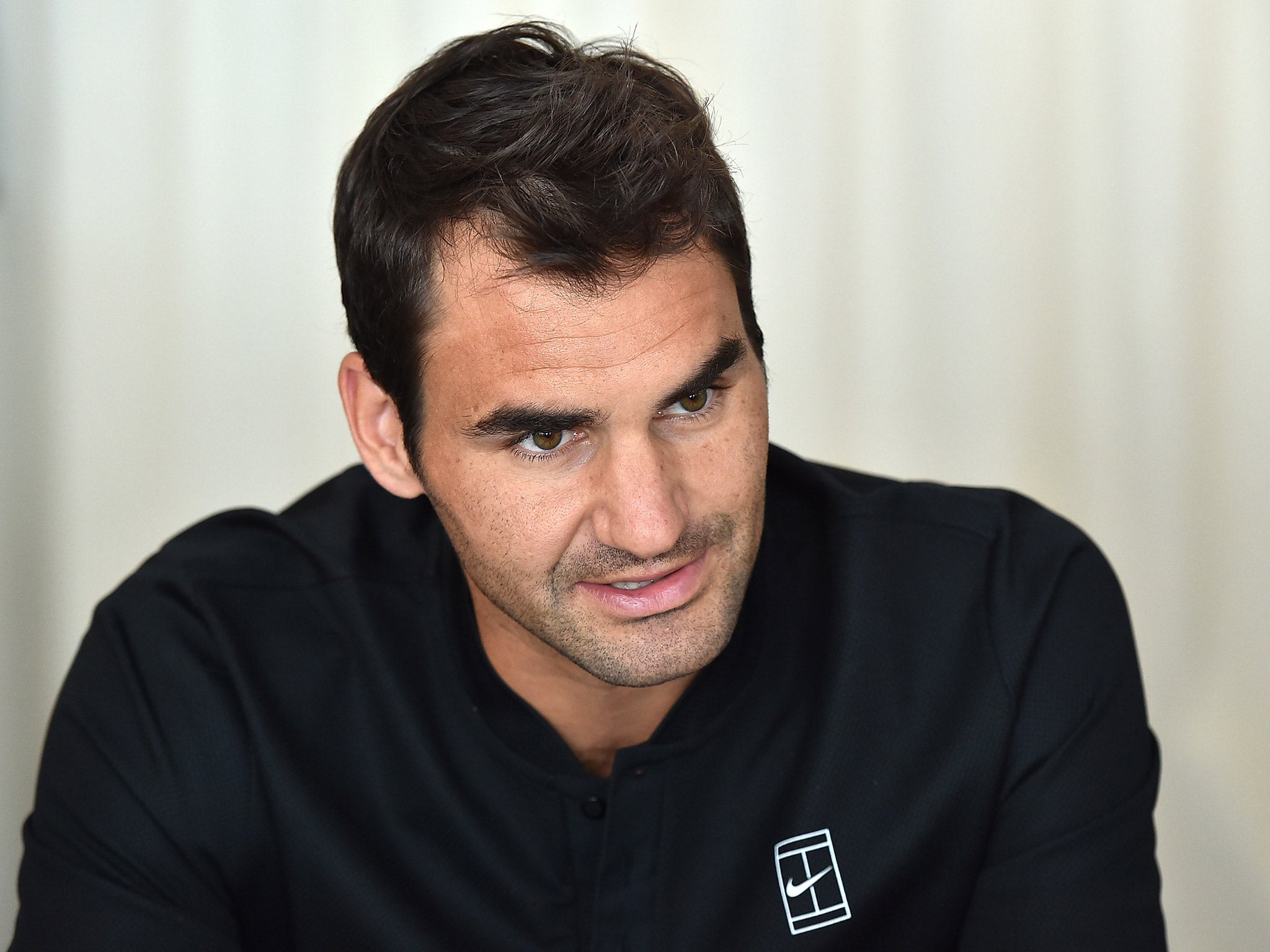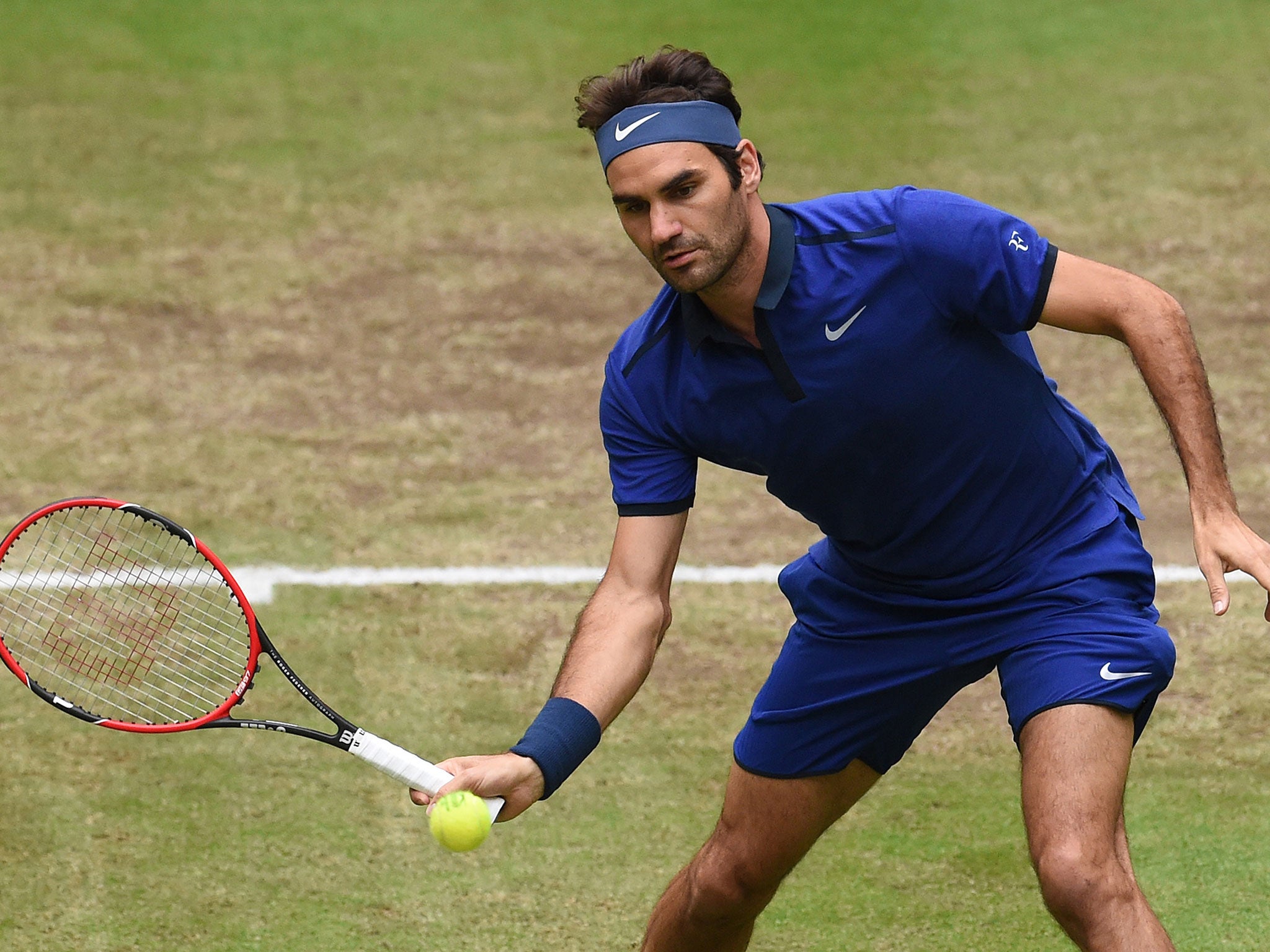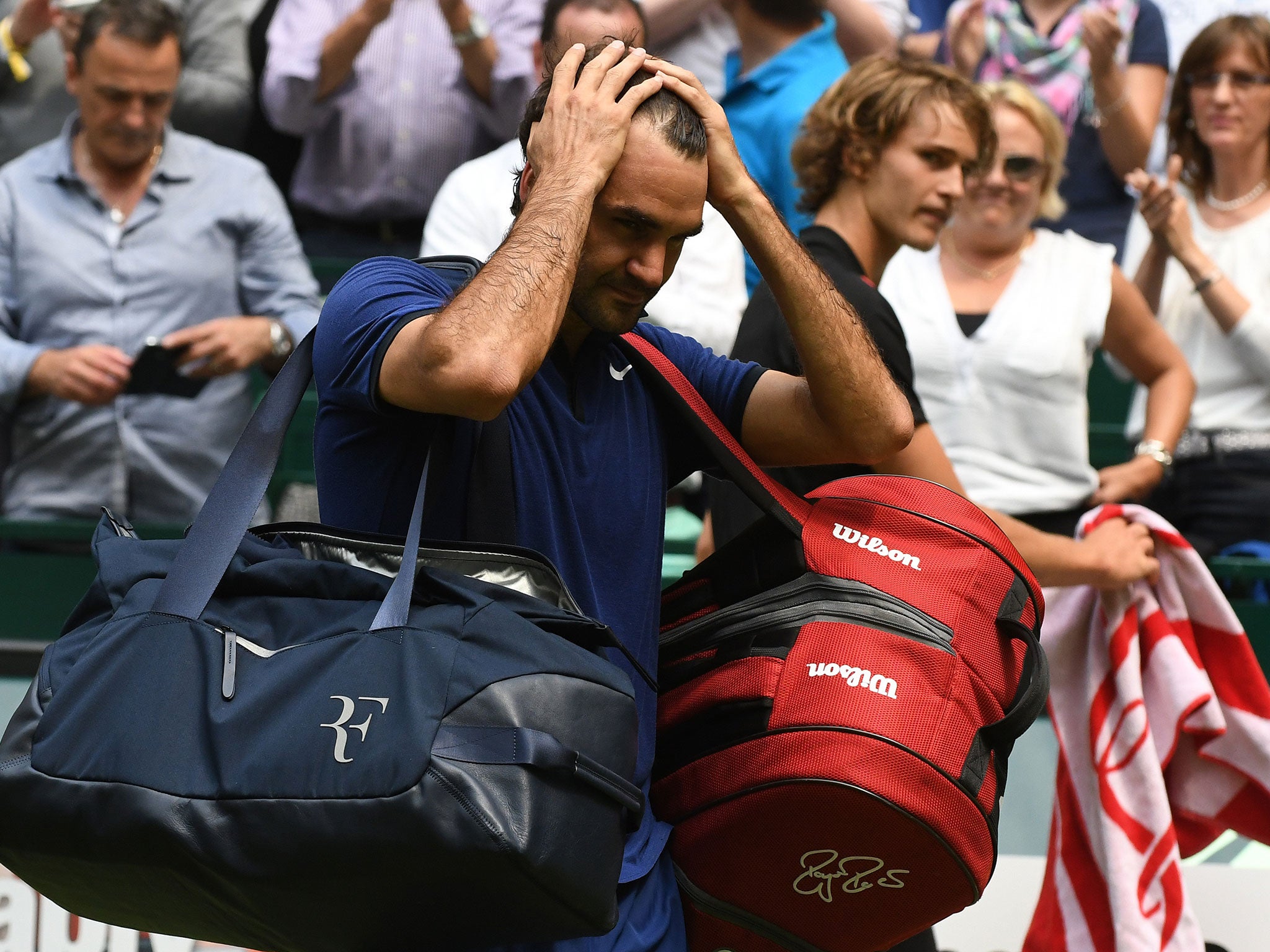Wimbledon: Roger Federer insists he still cannot see the end of the road
Despite recently missing his first Grand Slam in years, Swiss is determined to carry on, he tells Paul Newman in an exclusive interview

There have been times, even in the recent past, when Roger Federer has made you wonder whether he might just go on for ever. Who could have imagined that he would play one of the matches of his life, just a month before his 34th birthday, to deny Andy Murray at Wimbledon last summer? Or that Novak Djokovic, having swept through 2015 in all-conquering style, would lose to the Swiss at last season’s year-ending Barclays ATP World Tour Finals?
In the first two months of this year, however, the 17-times Grand Slam champion confronted his own mortality, at least in terms of his tennis life. On the day after his loss to Djokovic in the semi-finals of the Australian Open Federer was running a bath for his twin daughters when he turned and felt something click in his left knee. Within a week he was back home in Switzerland having surgery on a torn meniscus.
“There was definitely a time of, say, 12 hours before and after the surgery and then going through the night and waking up in the morning when things were a bit fragile in my world,” Federer admits.
“I realised that you’re like a passenger. You have to trust the people who are doing the surgery and are taking care of you, that it’s the right thing, that you’ll be OK again. It was hard for me, especially for about two hours or so. I was very emotional about it, going into the surgery. I was scared. Waking up from surgery, I was worried.”

If Federer’s recovery from the operation went as well as he could have expected – he was back competing in Monte Carlo within 10 weeks and would have returned four weeks earlier than that but for falling ill at the Miami Masters – it was not the end of his physical troubles. A back problem kept him out of the recent French Open, which ended his record run of 65 consecutive appearances in Grand Slam tournaments. The last he had missed was the 1999 US Open.
You learn never to write off Federer, but as he prepares to contest his 18th successive Wimbledon it is impossible not to wonder how much longer he has left in top-level competition. He returned to fitness this month to play two grass-court tournaments in the build-up to Wimbledon, but the symbolism in his defeats in Stuttgart and Halle to two of the game’s most exciting youngsters, 22-year-old Dominic Thiem and 19-year-old Alexander Zverev, was inescapable.
Federer, who will be 35 in August, admits he had cherished the extra time at home this spring but insists that he still enjoyed getting back on the road. Sitting back in his chair as he analyses his tennis life, he looks as relaxed and at ease as he has always done.
“I think it works both ways, for me anyway,” Federer says. “Whenever you leave your home, especially if you’ve been there for a while, you’re happy to be in the car with a trunk full of luggage. You might be travelling two hours or 20 hours, whatever it is, but you’re excited to go again.
“That has always been there and it’s the same the other way. The moment you come back home it’s nice to drive up to your house or apartment, whatever it is.
It was hard for me, especially for about two hours or so. I was very emotional about it, going into the surgery. I was scared
“As a family man and just as a tennis player, you love those times when you’re in one place for a longer period of time, even more so when it’s at home.”
Had this year’s experience not made him think that he would like to spend more quality time at home on a more permanent basis? After all, Federer and his wife Mirka have two sets of twins – six-year-olds Myla and Charlene and two-year-olds Leo and Lenny – to bring up.
“That will come one day at some stage regardless of whether I want it or not,” he smiles. “When my tennis is over I can choose how much I want to have of that. It doesn’t need to be right now, in my opinion. That’s why the thought actually doesn’t really cross my mind, because I’m happy to play and happy to travel.”
All players would like to stop competing on their own terms. Was the knee injury – and the first surgery he has ever had to undergo as a professional player - a reminder that his career could finish at any stage?

“Yes it was, but I knew that before I got injured,” Federer says. “I always said that waking up one morning and finding that the motivation is not there any more is something that could happen to any player. I have a hard time understanding how that can happen, but it could, if results start to fade away or you get injured – as happened to me at a moment when I was doing something I’d done a million times before, a movement that was completely normal.
“Also, if something happens to your family, your parents or your friends, that can really rock your world. That’s also something that can put everything in perspective and you retire because of that.”
Does he ever wonder what he might be doing in 10 years’ time? “Well, clearly I would like to spend a lot of time with my wife and my kids,” he says. “I would probably have more time with my wife on a daily basis. I would think so, I would hope so. Even though I spend every day of my life with her, it’s all around taking care of the kids and being well organised and all of that. They need a lot of attention now, our four kids.
“That’s all going to be easier as we move on. OK, bigger kids, bigger problems, I get that. But you’re not going to see them as much. We already see it now when we send them to tennis camps or tennis lessons. The next thing you know you don’t see them for a day. It’s good for them but not great for us, but it is what it is. That’s only going to happen more with school coming in, so we’ll have more time for ourselves.”
For the time being, nevertheless, Federer insists that retirement is not on his radar. “I’ve tried really to put zero thought into it, because I feel like it needs to be a natural decision, one that I feel comfortable with,” he says.
I’ve tried really to put zero thought into it, because I feel like it needs to be a natural decision, one that I feel comfortable with
It helps, of course, that Federer loves the life of a tennis player, even if there are aspects that he could do without. Like what? “Getting cameras shoved in my face all the time when I’m on site, especially with the telephones these days,” he says. “You might think that’s normal and that I should respect it. I do understand it, but it’s constant, all the time.
“Do I enjoy being the centre of attention? Yes, sometimes, most likely I do love it, but there are clearly things you don’t like. Do I like being stuck in traffic going to the airport with the kids screaming in the back? I’m not sure. But it’s part of the tennis life, 99 per cent of which is nice.
“I just think you have to be clever in your scheduling to make it fun for yourself. Maybe you don’t travel in the way that some players go from Europe to Asia and Europe to South America and back. I could do that but I choose not to, so that I make it easier on myself. I calculate how many jet lags I want go through and how many I want to put my kids through. Being based in Dubai as a tennis camp is actually a good thing for me.
“Then you have to maybe make it fun with the hotels you stay at. I drive myself at probably 40 per cent of the events. I drive myself in Australia, in Dubai, Indian Wells, Miami, Cincinnati. I love to drive my own car.
“I enjoy that rather than having a driver with me I feel I can’t really speak to because I feel like I don’t know this person. Or when we have a driver I have the same driver I’ve had for the last 10 years, so basically we’re friends now. So you can make it fun for yourself on the tour. You just have to know how to do it.”
When the day does come to put his rackets away, might he still have a future in tennis? “I would hope so though I don’t know in what field,” Federer says.
“I haven’t thought about it a whole lot, but I’ve always loved tennis. Tennis has given me all and more. Of course I’d like to stay involved in some ways. Maybe just on a very simple level, helping kids in Switzerland. Who knows?”
Join our commenting forum
Join thought-provoking conversations, follow other Independent readers and see their replies
Comments